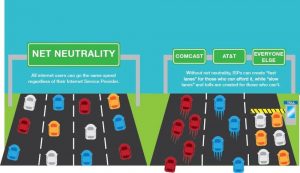
The ruling means Internet service providers (ISPs) such as Verizon, AT&T, and Comcast will continue to have the legal right to block or slow down websites they don’t like or charge more for faster Internet service.
Timothy Karr, senior director of strategy for the advocacy group Free Press, says the ISPs may now be emboldened to push websites that they own, and thus stifle competition and freedom of expression. “It’s really the Wild West out there,” Karr states. “Without net-neutrality protections, control over the Internet falls into the hands of these very large phone and cable companies that have their own interests in prioritizing certain content over others.”
FCC Chairman Agit Pai, a Trump appointee and former attorney for Verizon, welcomed the decision, saying net neutrality has stifled telecom investment. The decision did, however, make it clear that the FCC cannot block state-level net-neutrality laws, such as the one California passed last year.
Indiana’s legislature has enacted no similar protections. In April, the U.S. House passed the Save the Internet Act, which would restore the protections. But a Senate version was blocked by the Republican leadership.
Karr says a lot depends on the next election. “Realistically, much of this rests on November 2020 and what happens with elections in Congress, and who ends up as president of the United States,” he states. “Depends on who’s in power.”
The biggest Internet service providers, which spent millions of dollars lobbying for the repeal, have not implemented anti-competitive policies thus far, but they have not ruled out doing so in the future.



